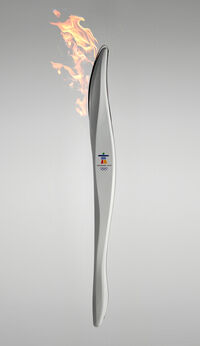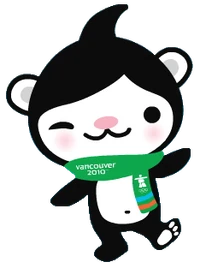The 2010 Winter Olympics (officially the XXI Olympic Winter Games and also known as Vancouver 2010) were an international winter multi-sport event held between February 12 and 28, 2010 in and around Vancouver, British Columbia, Canada. A joint project between the Vancouver Organizing Committee (VANOC) and the International Olympic Committee (IOC), they were the third Olympic Games held in Canada (after 1976 and 1988).
The decision was made on July 2, 2003, when the city was chosen and announced as the host city. 82 nations competed in seven sports divided into 86 events. Governor-General Michaelle Jean declared the Games open during the opening ceremony. These were the first Olympics to have the opening and closing ceremony indoors, as well as the first to have two Olympic cauldrons. They were also the first Winter Olympics to take place by the sea, with some venues such as the Richmond Olympic Oval at sea level. Vancouver is also the warmest city to host the Winter Olympics, as well as the largest.
To get Canadian athletes ready to compete in the program, "own the podium" was put into place to help athletes step up to the challenge to get the first gold medals on Canadian soil. In addition to winning its first gold at the 2010 Games, Canada smashed the record for most gold medals on home soil, with 14 total.
Bidding[]
Voting[]
| Voting results for the 2010 Winter Olympic Games | ||||
|---|---|---|---|---|
| City | Country | Round 1 | Round 2 | |
| Vancouver | Canada | 40 | 56 | |
| Pyeongchang | South Korea | 51 | 53 | |
| Salzburg | Austria | 16 | ||
Historic Events[]
- Just before the Games began, Georgian Luger Nodar Kumaritashvili was taking a practice run when his sled left the track and caused him to hit a pole, killing him. The Georgian team bravely entered the stadium during the opening ceremony wearing black armbands and then left immediately afterwards.
- Chile bravely attended the closing ceremony despite worry for their families after a massive earthquake ripped through Chile. A small black flag was attached to the Chilian flag when their flag bearer entered BC Place Stadium.
- Canada's Joannie Rochette bravely skated herself to a figure skating bronze medal, after her mother Therese passed away four days before. She was also one of the athletes to be awarded the Terry Fox award for her courage, and was Canada's flag bearer for the closing ceremony.
- In the figure skating competition, Kim Yu-na blew away the competition with a spectacular performance to give South Korea their first-ever Figure Skating gold.
- The first North American Ice Dancers to win gold went to Tessa Virtue and Scott Moir of Canada, who smashed the competition with a beautiful display of skill and talent.
- After already clinching the gold, American snowboarder Shaun White landed a spectacular "Double McTwist 1260". This is the first time a double McTwist has been landed in competition.
- The first ever gold medal won on Canadian soil went to freestyle skier Alexandre Bilodeau in men's moguls.
- Canada was the first team to receive gold in both men's and women's hockey on home ice, and the first to have a gold in hockey on home ice since Lake Placid 1980.
- Cayman Islands, Colombia, Ghana, Montenegro, Pakistan, Peru, and Serbia all made their first ever winter Olympic appearance.
Mascots[]
The official mascots of the 2010 Winter Olympics and the 2010 Paralympics in Vancouver were Miga and Quatchi, and Sumi respectively, who had a sidekick named Mukmuk. Designed by the Candian and American duo Meomi Design [1], the mascots were revealed on November 27, 2007 to 800 schoolchildren at the Bell Centre For Performing Arts in Surrey, British Columbia. It marked the first time that both the Olympic and Paralympic mascots were revealed simultaneously, as well as the first time they had an official sidekick.
Miga and Quatchi[]
Miga and Quatchi were the official mascots of the 2010 Winter Olympics in Vancouver.
Miga (left) is a mythical sea bear, part orca and part Kermode bear living off the coast of Vancouver Island. She loves to surf in the summer, especially in Tofino, and snowboard in the winter. Her green scarf was given to her by Mukmuk.
Quatchi is a sasquatch (Bigfoot). He comes from the mysterious forests of Canada, wears blue earmuffs, and dreams of being a hockey goalie. He loves to travel and learn about the regional dances and cuisines of every place he visits. He carries his camera around his neck wherever he goes.
Sumi[]
Sumi was the official mascot of the 2010 Paralympic Games in Vancouver. He's an animal guardian spirit with the wings of a Thunderbird and legs of a black bear who wears an orca-like hat in an artistic style of Haida people. He lives in the mountains of British Columbia and is a passionate environmentalist. His name comes from the Salish word "sumesh," meaning "guardian spirit."
Mukmuk[]
Mukmuk was a sidekick to the aforementioned mascots. He is a marmot from the sub-alpine meadows of Vancouver Island described as "small and friendly". As of December 2008 he has joined the other mascots as a plush toy, but not yet a life-size mascot costume. His name comes from the Chinuk Wawa word "muckamuck," meaning "food" or "to eat", because of his large appetite. Although he was only a designated sidekick, Mukmuk was a run-away success, "capturing the hearts of Games-goers everywhere"; including an impromptu "protest" at the Vancouver Art Gallery to make him a full-fledged mascot, and making 24 Hours' "Top 5" for the Olympic Games. [2]
Pedobear Controversy[]
In 2009, Canadian artist Michael R. Barrick created a photoshopped image of the Vancouver 2010 mascots with the internet meme Pedobear, who was popularized by the imageboard 4chan. The images were created to make "a visual critique of how the style of the mascots resembles the style of Pedobear."[3] As a result of the images receiving high rankings on Google Images, this image was mistakenly used by other media. The Polish newspaper Gazeta Olsztyńska used one the images for a front page story about the then-upcoming Olympics, published on February 4, 2010 [4]. Similarly, the Dutch television guide Avrobode used one of the images.
Medals[]
Canada took a unique stand on the creation of the 2010 Olympic medals. For each of their medals, they took an aboriginal artwork pattern and then took parts of the work and placed it on the front of each medals so every medal given out during the Olympics was completely unique. Each medal winning athlete also got a cloth picture of the artwork so they could find where their medal fits in. Each medal also got a few bends in it to make the medals truly different from anything given out before.
Torch[]

2010 Olympic Torch
Much like the rest of the Games, Canada created a unique torch to go with their Games. Canada took the longest torch relay ever in Olympic history. After being lit in Olympia, Greece, it went by plane to Victoria, British Columbia, and then traveled across the Yukon, Northwest Territories and Nunavut. It then traveled to Saint Johns, Newfoundland and Labrador, and then across Nova Scotia, Prince Edward Island, New Brunswick, Quebec, Ontario, Manitoba, Saskatchewan, Alberta, then finished back in Vancouver, where the two torches were lit at BC Place and at the waterfront. In every major city in Canada, a small cauldron was lit, and there would be a major celebration before the torch continued on its way to Vancouver. The torch run lasted from October 30, 2009 to February 12, 2010, and took a total of 106 days to complete. The torch was designed by the aerospace division of Bombardier Inc. It was most notable leading up to the event for it's resemblance to a marijuana joint when turned on its side.
Venues[]
The Olympic winter venues were placed around the Vancouver area to take advantage of the wide range of land.
Vancouver[]
- BC Place Stadium (location of the opening and closing ceremonies as well as medal presentations for most events)
- Canada Hockey Place, aka Rogers Arena (formerly GM Place) (main ice hockey arena)
- Hillcrest Park (curling)
- Pacific Coliseum (figure skating and short track speedskating)
- Vancouver Convention and Exhibition Center (media centre)
- Vancouver Olympic village
University of British Columbia[]
- UBC Winter sports center (secondary ice hockey arena)
- UBC Thunderbird Arena (sledge hockey arena)
Richmond[]
- Richmond Olympic oval (long track speedskating)
West Vancouver[]
- Cypress Mountain Resort (freestyle skiing and snowboarding)
Whistler[]
- Whistler Olympic and Paralympic village
- Whistler Creekside (alpine skiing)
- Whistler Olympic Park in Callaghan valley (biathlon, cross country skiing and ski jumping)
- Whistler Sliding Center (bobsled, luge and skeleton)
Medal table[]
| Rank | Country | Total | |||
|---|---|---|---|---|---|
| 1 | Canada | 14 | 7 | 5 | 26 |
| 2 | Germany | 10 | 13 | 7 | 30 |
| 3 | United States | 9 | 15 | 13 | 37 |
| 4 | Norway | 9 | 8 | 6 | 23 |
| 5 | South Korea | 6 | 6 | 2 | 14 |
| 6 | Switzerland | 6 | 0 | 3 | 9 |
| 7 | China | 5 | 2 | 4 | 11 |
| 7 | Sweden | 5 | 2 | 4 | 11 |
| 9 | Austria | 4 | 6 | 6 | 16 |
| 10 | Netherlands | 4 | 1 | 3 | 8 |
| 11 | Russia | 3 | 5 | 7 | 15 |
| 12 | France | 2 | 3 | 6 | 11 |
| 13 | Australia | 2 | 1 | 0 | 3 |
| 14 | Czech Republic | 2 | 0 | 4 | 6 |
| 15 | Poland | 1 | 3 | 2 | 6 |
| 16 | Italy | 1 | 1 | 3 | 5 |
| 17 | Belarus | 1 | 1 | 1 | 3 |
| 17 | Slovakia | 1 | 1 | 1 | 3 |
| 19 | Great Britain | 1 | 0 | 0 | 1 |
| 20 | Japan | 0 | 3 | 2 | 5 |
| 21 | Croatia | 0 | 2 | 1 | 3 |
| 21 | Slovenia | 0 | 2 | 1 | 3 |
| 23 | Latvia | 0 | 2 | 0 | 2 |
| 24 | Finland | 0 | 1 | 4 | 5 |
| 25 | Estonia | 0 | 1 | 0 | 1 |
| 25 | Kazakhstan | 0 | 1 | 0 | 1 |















